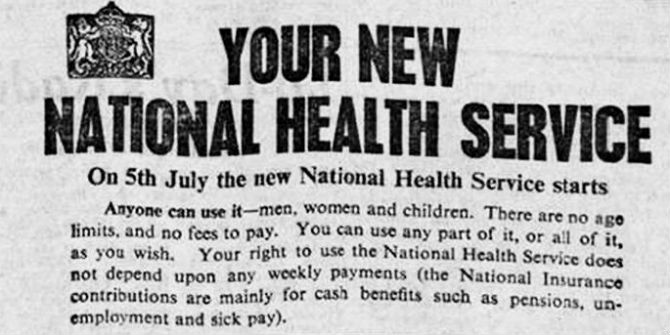


 Vote Leave are resting the NHS’s fate in the hands of the referendum, claiming that leaving the EU will save the NHS, supported by a letter from 50 health professionals. The Remain camp support the opposing view, with 200 health professionals supporting the Healthier in EU campaign. This briefing by (left to right) Elias Mossialos, Victoria Simpkin, Oliver Keown and Lord Darzi, while not an exhaustive list, aims to facilitate the debate by providing evidence to support or refute the key claims that are being made.
Vote Leave are resting the NHS’s fate in the hands of the referendum, claiming that leaving the EU will save the NHS, supported by a letter from 50 health professionals. The Remain camp support the opposing view, with 200 health professionals supporting the Healthier in EU campaign. This briefing by (left to right) Elias Mossialos, Victoria Simpkin, Oliver Keown and Lord Darzi, while not an exhaustive list, aims to facilitate the debate by providing evidence to support or refute the key claims that are being made.
If the UK leaves the EU there will be ‘£350 million a week’ to spend on the NHS
A key argument of the Vote Leave group is that ‘£350 million a week’ is sent to Brussels. This figure, refuted by the Institute of Fiscal Studies, does not take into account any rebate that the UK receives. In 2015, the UK made a gross contribution of £17.9 billion, which after the rebate was £12.9 billion. The UK received an estimated £4.4 billion of public sector payments (e.g. for structural funding and agriculture) and, therefore we were net contributors of £8.5 billion. This figure does not account for the many numerous associated economic benefits, including trade, jobs and investment. For example, our education system benefits – universities attract high-flying international students and also generate revenue – indeed the 125,000 EU students studying at UK universities in 2012–13 generated £2.27 billion for the UK economy.

If we vote to leave Europe – receiving our net contribution valued at approximately £164 million per week, rather than the often quoted £350 million – we would still not be able to reinvest all of the repatriated monies into our underfunded NHS as is often suggested. This money would be needed to negotiate trade deals, particularly if we want access to the single market, in order to fund agriculture and research, and to fund other areas which are currently heavily supported by EU contributions. Countries outside the EU, such as Norway, who want access to the single market, still make contributions to the EU budget. Norway’s contribution to the EU in 2011 was £106 per capita, compared with the UK’s net contribution of £128 per capita in the same year. Based on Norway’s contribution to participate in the single market, the UK could save £27.3 million per week by leaving the EU. This would equate to savings of £1.4 billion annually, which is still far less than the NHS’s £2.45 billion budgetary deficit in 2015/16 alone. Furthermore, it would leave the UK with no influence in decision making. However, the supporters of leaving the EU offer Switzerland as a model for what could be achieved by the UK. While the Swiss contribution is significantly less than the UK, if the UK paid the same per capita rate its net contribution would fall by 55% and Switzerland has very different policy goals to the UK, including on security. It is likely that we would be negotiating very different agreements.
The EU can make decisions about the NHS which could lead to privatisation – leaving the EU can protect the NHS
Article 168 of the Treaty on the Functioning of the EU states that the organisation and delivery of health services is a national responsibility. EU competition law governs trading market structures and behaviour with the EU’s internal market. While it does apply to market provision within national health systems, there are exemptions with respect to national decisions. The UK has adopted national legislation (the Competition Act and Enterprise Act) that runs parallel to EU provision and therefore leaving the EU is unlikely to change the fundamentals of competition regulation in the UK.
By staying in the EU there is a fear that we will lose control of how we fund our NHS. The financing and provision of health services is a national competence for the EU member state governments to decide. EU law actually protects the financial security of the NHS by not requiring member states who currently deliver public services through the public sector to open them up to competition from the independent sector. While countries such as Greece, Spain and Portugal have had to restructure their health services to meet obligations under the Troika, as the UK is not part of the European Monetary Union (EMU), we do not have to meet specific fiscal requirements.
How we organise and fund our health system is defined by our national government and not by the EU. Data from the OECD demonstrates that in 2013 the UK spent 8.5% of its GDP on public and private healthcare, positioning the UK 13th out of the original 15 countries of the EU and 22nd out of the 34 OECD countries; this number has waxed and waned with successive governments. While this should not be affected by leaving, nor remaining in, the EU, our tax-funded NHS will be affected by any economic shocks that may occur, by reducing tax revenue even in the short term.
It was the UK Conservative government that introduced market-oriented reforms to the NHS in the 1990s and the UK coalition government that introduced the Health and Social Care Act, which came into force on 1st April 2013, and changed the organisation of the NHS. It is successive UK governments who will continue to determine the structure and financing of the NHS, in or out of the EU.
EU doctors and nurses flood our employment market. Leaving the EU will open up health sector employment for UK workers
The European Commission estimates a potential deficit of one million healthcare workers across the EU by 2020. Most member states are facing critical shortages. With this in mind, OECD data demonstrates that in 2012 the UK had 2.8 practicing physicians per 1000; below the OECD average of 3.2 doctors per 1000 population. The number of practicing nurses was 8.2 per 1000 against an OECD average of 8.8. There is no doubt that Britain does not have the medical workforce that it requires to serve its ageing population and we rely on foreign doctors and nurses to fill our positions; the proportion of foreign nationals working as professionally qualified clinical staff is 14% with that increasing to 26% for doctors. Data from the General Medical Council (GMC) shows that 36.7% of our doctors are non-UK trained with 11% trained in the EEA (excluding the UK) and the remaining 25.7% being trained internationally. The argument that EU workers are taking our health sector jobs cannot be substantiated.
While Eurosceptics may argue that this deficit is a workforce planning issue which the UK government can address by training more UK health workers – this takes time and money, and with the ageing population a growing workforce is needed, not a diminishing one. With the current homegrown crisis within the NHS there are risks that the number of UK healthcare workers will diminish further as they leave to work overseas or in other industries.
Britain needs to be in a position to attract well-qualified health workers to the UK; if we leave the EU we potentially lose out on a workforce with a common set of professional standards and agreed rules on medical education. A Britain outside of the EU would have to renegotiate these standards and would have no part in shaping future regulations. EU law allows automatic recognition of professional qualifications within the EU. This does not extend to non-EU citizens who are assessed individually by regulatory bodies (GMC and Nursing and Midwifery Council). A UK outside the EU would be doing this for all recruitment of health workers, increasing pressure on an already over-burdened system.
The Trans-Atlantic Trade and Investment Partnership (TTIP) may encourage privatisation of national health services; leaving the EU will protect our NHS
The Trans-Atlantic Trade and Investment Partnership (TTIP) is a trade pact which is in the process of being negotiated between the EU and the USA. The objective is to remove unnecessary barriers to market access and investment to facilitate free movement of goods and trade. Critics fear American health providers may target the NHS, leading to the privatisation of health services. EU proposals, however, are freely available on the Commission’s website. While healthcare services may be within the scope of the agreement it seems that both the EU and member states will be able to agree TTIP reservation clauses for their national health services.

From a positive perspective there is scope for the TTIP to lead to improved UK standards of patient safety. This may be in the domain of medical devices by harmonising the EU with the higher surveillance standards in the USA as well as in mutual recognition of standards in drug manufacture.
If the UK wants access to the European single market, despite being outside of the EU, it would still need to comply with a regulatory framework determined by the TTIP. The only difference would be that the UK would no longer have a voice in the negotiating process.
The pharmaceutical industry is likely to suffer if the UK leaves the EU
We have access to world-class medications. The UK is the top location in Europe for investment in pharmaceutical and biotechnology research and development. Access to the EU single market is one of the key reasons that global biopharmaceutical companies locate their European headquarters in the UK. The UK Pharmaceuticals Industry is the fourth largest in the world, with drugs originating in the UK taking a 16% value share of the world’s top 100 selling drugs in 2008; 51% of UK medicinal and pharmaceutical products are sent to EU27 countries, amounting to approximately £11 billion in revenue for firms based in the UK.
The European Medicines Agency (EMA) is based in London and is the centre of EU pharmaceutical regulations. It harmonises the work of national regulatory agencies, providing centralised marketing authorisations. These allow companies to submit a single application to the EMA to obtain a marketing authorisation which is valid in EU, EEA and European Free Trade Association (EFTA) countries. The total budget of the EMA is €324.7 million. The UK leaving the EU would likely see the relocation of the EMA and its employees.
The Medicines and Healthcare products Regulatory Agency (MRHA) would remain our national regulatory agency. There are currently four ways to get marketing authorisation in the UK. Centralised authorizations are made directly to the EMA. National authorisations, intended for marketing only in the UK, are made directly through the MRHA. For medicines that have achieved a marketing authorisation in another EEA member states, the mutual recognition procedure is available. The method of decentralised authorisation is similar but is used for those medicines that have not received a marketing authorization at the time of application.
If the UK leaves the EU and leaves the centralised authorisation system, companies would need to obtain a separate national authorisation from the MRHA for their drugs to be licensed in the UK; this may be unappealing for industry and this could ultimately affect patient access to medicines.
If the UK wants to continue our current lucrative trade deals and be part of the centralised authorisation system we would still need to pay fees to the EMA and comply with the same regulatory requirements but we would be observers in the process, with limited scope to shape EU legislation.
The National Institute for Health and Care Excellence (NICE) would also be likely to suffer if the UK leaves the EU. It would not be in a position to influence European developments on health technology assessments (HTA), for which is it is currently a leading agency.
Staying in the EU will hold back the UK in medical research and technology?
British patients benefit from world-class treatments developed using cutting-edge research. The UK has a leading position in medical science and innovation. International collaboration is key to furthering scientific research; allowing the free movement of researchers in the EU mobilises excellent scientific talent. Access to EU infrastructures and networks encourages UK innovation and enhances the UK’s global influence. The UK hosts the headquarters of six pan-European research facilities known as Infrastructure for Systems Biology-Europe (ISBE) at Imperial College London and also plays a part in European intergovernmental research organisations such as CERN.
The UK life-science sector benefits from our membership of the EU. The UK is a net recipient of EU funding in this area. The Office of National Statistics’ (ONS) estimated figure for the UK’s contribution to EU research and development between 2007–2013 was €5.4 billion but the UK received €8.8 billion in direct EU funding for research, development and innovation activities during this timeframe. The main EU funding mechanism for research, development and innovation is Framework Programme (FP) funding which is competitively awarded. After Germany, the UK was the second largest recipient in absolute terms of FP7 funding (2007–2013), although relative to GDP and population size only the Netherlands received a higher proportion of the funding.
The current FP funding is called Horizon 2020, managed by the European Commission Directorate General for Research and Innovation. Horizon 2020 has a budget of €74.8 billion for 2014–2020. It contributes funding to the Innovative Medicines Initiative (IMI), a large public-private partnership between the EU and the European Federation for Pharmaceutical Industries and Associations that aims to speed up the development of, and access to, innovative medicines. Leaving the EU may jeopardise the UK’s access to funding and involvement in the IMI.
Critics argue that the UK could follow Switzerland’s model if we leave the EU. Indeed ‘Associated Country’ status is open to countries that are members of the European Free Trade Association (EFTA) and current EU candidate nations. While this allows access to funding, these countries contribute proportionally to their GDP and have no role in the negotiations of the research agenda. Switzerland provides a case study of the difficulties of being outside the EU. In 2014, Switzerland voted to limit mass migration; within a fortnight of the referendum Switzerland was relegated to ‘third country status’ for the purposes of EU funding. Switzerland now has a partial association deal so that they can compete for limited Horizon 2020 funding but it provides an example of what may happen to a UK outside of the EU, especially as a key concern for the Leave campaign is immigration.
We want to maintain our position at the cutting edge of research and development; while this may still be possible outside the EU, as a non-member state, the UK would have no role in the negotiations that can shape EU research funding.
EU migration is overburdening our public services including the NHS
According to the Office of National Statistics Labour Force Survey (2015) there are 3.3 million EU citizens living in the UK. In the year ending September 2015, the last immigration estimate was 617,000 people, with immigration of EU citizens to the UK estimated to be 257,000 and non-EU immigration to the UK estimated to be 273,000. The number of returning British citizens immigrating back to the UK was estimated to be 87,000.

The possibility of FYR Macedonia, Montenegro, Serbia, Albania and Turkey joining the EU has led to further immigration concerns. There are many obligations that these countries need to fulfill before being admitted entry and if they manage to address these issues they will be quite different countries in terms of institutions and respect of human rights and democratic processes. A Britain outside of the UK will have no role in the negotiation process.
International Passenger Survey (IPS) estimates show that approximately 60% of immigrants arriving for employment in the UK are EU citizens, 24% are non-EU citizens and 15% are British citizens31. EU migrants tend to be younger than the native population32. Migration Observatory analysis of the Labour Force Survey indicates that the unemployment rate among EEA nationals in the UK was 5.2% in the last three months of 2014. EU migrants accounted for only 2.5% of benefits administered in 2014 by the Department for Work and Pensions and 7% of tax credits.
It is important to remember that if the UK were to leave the EU but still wanted to retain full access to the single market, it is likely that rules on freedom of movement would remain the same. Visitors to the UK and non-permanent residents (excluding those who are ‘ordinarily resident’) generate a significant cost to the NHS. Those citizens from the EEA cost the NHS £340 million a year while non-EEA citizens and temporary migrants generate a cost of approximately £1.07 billion a year. This is out of an NHS total annual expenditure of £113.3 billion in 2014–2015. Out of the £340 million a year from EEA visitors, £180 million is potentially recoverable through the European Health Insurance Card, while the remainder is potentially recoverable through other arrangements including the S1 card which allows state pensioners to access healthcare in the European country they have retired to and for that country to reclaim costs. In 2013–14, it was estimated that the NHS recovered less than 20% of potentially recoverable costs (approximately £50 million) from the EEA34. A similar picture was seen for non-EEA visitors. In view of this, the Department of Health has implemented a Cost Recovery Programme, which is targeted at visitors and temporary migrants to try to recover some of these costs.
One aim of the Cost Recovery Programme is better identification of EEA patients so that home countries can be charged. Non-EEA nationals coming to the UK for more than six months now have to pay an immigration health surcharge with their visa application fee. This fee is upwards of £150 for students and is already in place, with this year’s LSE students paying. Whether we stay in or leave the EU the same issues of recovering costs will remain.
Although the focus is on immigration, it must be remembered that approximately 1.2 million British citizens currently reside in the EU. The largest group live in Spain, followed by Ireland and then France36. Of this number, 400,000 claim state pensions from the UK37. While the UK transfers a fee to compensate for health care abroad for every UK pensioner legally living in other EU countries, it is likely to be an underestimate as it only applies to those who have registered with the local authorities. It should also be noted that 2.5% of British nationals residing in other EU countries claim unemployment benefits, a similar figure for those EU citizens in the UK.
Eurosceptics point out that the UK pays out a far greater amount than it recoups from other EU countries. Department of Health statistics indicate that in 2014–2015 the UK paid other EEA countries, and Switzerland, £614.4 million for the treatment of UK nationals (this includes visitors and UK pensioners). The UK recouped £49.7 million for NHS treatment of EEA, and Swiss, citizens. This may reflect inefficiency of recovering costs as well as the greater flow of British tourists to the EU. It should also be noted that approximately one-third of UK citizens living in the EU are pensioners and may generate a higher burden on that country’s health service. If the UK leaves the EU we will still need to recover these costs and it may be that UK visitors and pensioners in the EU will need to pay for their medical care. The final outcome would depend on the post-Brexit deal negotiated.
Conclusion
There are many issues at stake in this debate; immigration, trade, the economy and Britain’s sovereignty are all key players. The impact on public services and the NHS have emerged as further areas of contention in this battle. The evidence suggests that the concern about immigrants overusing our public services seems largely unsubstantiated. The excess we pay for our citizens who reside in other EU countries reflects the high number of UK pensioners living in the EU as well as our inefficiency at collecting fees, which is partly being addressed. The core principle of the NHS will continue to be defined by the UK government whether we remain in, or leave, the EU. This article highlights the additional benefits from retaining membership of the EU.
A full bibliography and sources for this post are available here.
This post represents the views of the authors and not those of the BrexitVote blog, nor the LSE.
Professor Elias Mossialos is Brian Abel-Smith Professor of Health Policy within the Department of Social Policy at the London School of Economics and Political Science, Director of LSE Health and Professor of Health Policy at Imperial College London
Dr Victoria Simpkin is Research Associate in Health Policy at the London School of Economics and Political Science
Dr Oliver Keown is Clinical Advisor and Policy Fellow at the Institute of Global Health Innovation, Imperial College London
Professor the Lord Ara Darzi of Denham is Paul Hamlyn Chair of Surgery and Director of the Institute of Global Health Innovation at Imperial College London, and a practicing surgeon at Imperial College Healthcare NHS Trust.







Perhaps a more important question is: Will there be any NHS at all if BREXIT wins and politicians of the likes of Boris Johnson get to run Britain outside the EU?